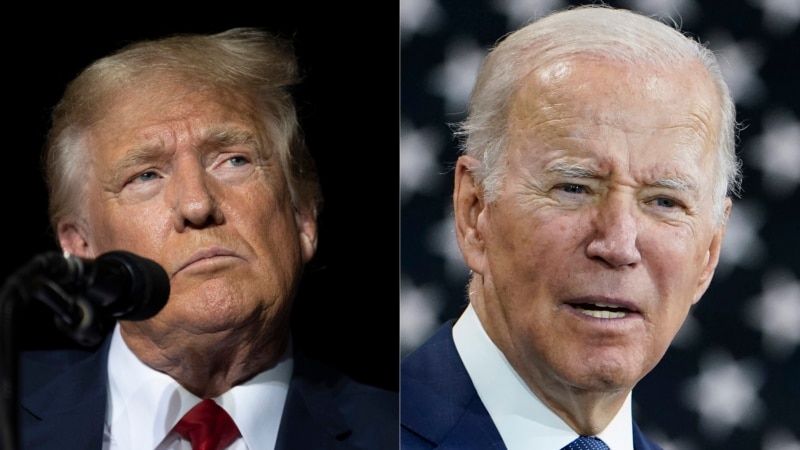
In the aftermath of presidential primary voting on Super Tuesday, in which Democratic President Joe Biden and former Republican President Donald Trump dominated their respective party’s ballots, the two men delivered caustic public messages about each other and starkly different descriptions of the state of the country.
In a statement issued Tuesday night, Biden warned that a second Trump presidency would pose an “existential threat” to American democracy. For his part, in a speech delivered at his Mar-a-Lago resort in Palm Beach, Florida, Trump referred to Biden as “the worst president in the history of our country.”
Experts say Americans can expect more of the same — probably much more — in the eight months leading up to the election.
‘People will be sick of it’
Seth Masket, a professor of political science and director of the Center on American Politics at the University of Denver, told VOA that because Biden and Trump are so well known to U.S. voters, they will be more focused on tearing each other down than on building themselves up.
Masket said he expects a lot of negativity in the campaign, with Trump attempting to convince Americans that, because of Biden, the economy and society at large are both falling apart, while Biden defends his record and reminds voters of the many dysfunctions of the Trump White House.
“Trump will be trying to portray conditions today as literally the worst conditions ever,” Masket said. “Biden will be trying to portray conditions now as good … and also, he’ll be trying to remind people of the chaos of the last year of the Trump administration, with the pandemic and the insurrection and all sorts of other things that were going on that year.
“Yes, people will be sick of it, but I have a hard time imagining they’ll divert from that,” he said.
‘Grievance and grift’
Biden reminded voters on Tuesday evening that he has presided over record levels of job growth and rising wages and has registered policy victories on prescription drugs and guns. However, the bulk of the statement focused on a warning about what a second Trump term might look like.
“If Donald Trump returns to the White House, all of this progress is at risk,” Biden said. “He is driven by grievance and grift, focused on his own revenge and retribution, not the American people. He is determined to destroy our democracy, rip away fundamental freedoms like the ability for women to make their own health care decisions, and pass another round of billions of dollars in tax cuts for the wealthy — and he’ll do or say anything to put himself in power.”
A Biden campaign strategy memo released to the press Wednesday morning also pressed the case against Trump.
“Donald Trump limps into the general election as a wounded, dangerous and unpopular candidate,” the memo said. “The Republican nominee is cash-strapped, beleaguered by a host of external issues, and is running on an extreme agenda that is already proving to be a significant liability for key voting blocs that are critical to the pathway to 270 electoral votes.”
‘Our country is dying’
Trump watched the Super Tuesday results from Mar-a-Lago and addressed a crowd of supporters afterward. The former president painted a bleak picture of the state of the country, claiming that the U.S. has taken “a great beating” during Biden’s three years in office.
He cited numerous challenges at home and abroad that have arisen during Biden’s tenure, including consumer price inflation and the wars in Ukraine and Gaza, insisting that none would have occurred if he had been in office.
Much of Trump’s focus was on the ongoing crisis at the southern border, which has left immigration authorities and state officials overwhelmed by hundreds of thousands of undocumented migrants. He asserted, without evidence, that the country is experiencing an immigration-driven crime wave.
“We’re going to have to deport a lot of people, a lot of bad people, because our country can’t live like this,” Trump said. “Our cities are choking to death. Our states are dying. And, frankly, our country is dying.”
Trump also accused the current president of mishandling the withdrawal of U.S. troops from Afghanistan, the U.S. relationship with China and issues related to energy independence.
On Wednesday, after losing 14 out of 15 primary elections the night before, former South Carolina Governor Nikki Haley, Trump’s sole remaining challenger for the Republican nomination, suspended her campaign. In a measure of his focus on Biden, Trump never mentioned her name in his speech Tuesday night.
Trump’s 2016 playbook
The themes that Trump stressed in his speech very much echoed the campaign he ran in 2016, when he focused on migration over the Southern border from the very moment he declared his candidacy.
“The former president has a history of using a playbook of divisiveness to try to move the ball forward,” Amy Dacey, executive director of the Sine Institute of Policy & Politics at American University, told VOA. “You saw this in 2016. He said that he understood people’s anger and angst and exactly who was causing it: It was individuals crossing the border.
“I think he’s going back to that 2016 playbook,” Dacey said. “Whether or not people will find that inspirational remains to be seen.”
Dacey noted that while Biden went after Trump directly on Tuesday, he will have the opportunity during his State of the Union address to Congress on Thursday night to highlight the ways he was able to compromise with other Republicans on major legislation during his first term, and to highlight areas of future potential cooperation.
“In the State of the Union this week, I think there will be some issues where there could be consensus, whether it’s curbing fentanyl and the drug problem, helping veterans or ending cancer. There are some things that are just definitely bipartisan and affect everybody, so how will he talk about that?”
